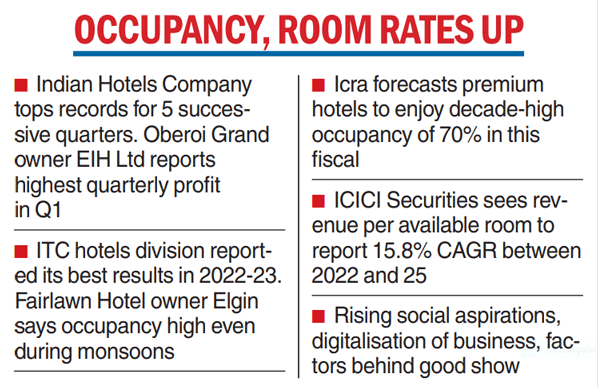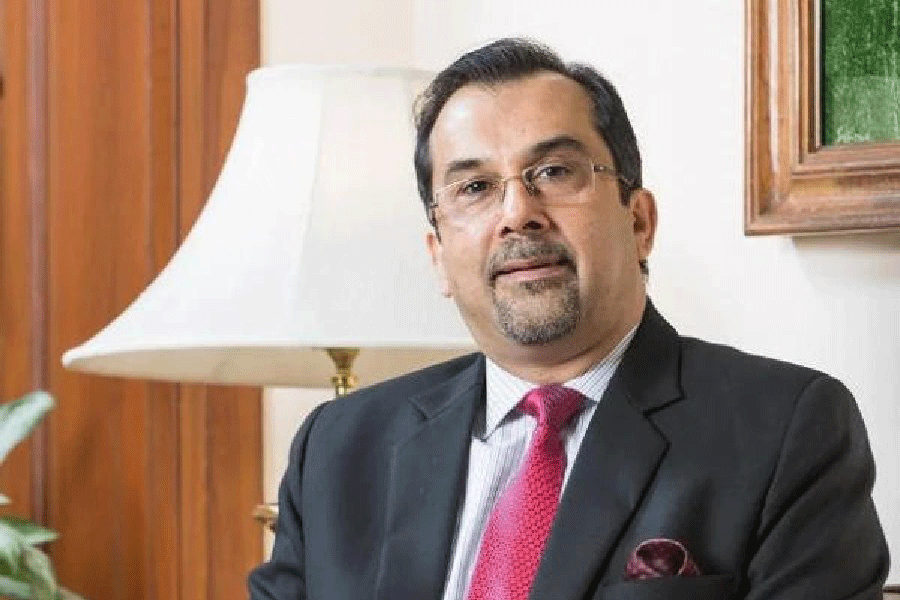When the ITC board meets on Monday to give the final touches to its hotel business demerger plan, the buzz around the Indian hospitality industry could perhaps not be any louder with multiple sector watchers painting a pretty picture for the foreseeable
future.
Vibes from hotel chains, rating agencies, brokerages and real estate circles are upbeat with all projecting upward moves in occupancy and room rates, the two most important metrics used to judge the health of the hospitality business.
After bearing the brunt of the Covid pandemic, far more than many other industry, as people were wary of travel, the hospitality industry has bounced back very strongly in India and worldwide. And the numbers are there for us to see.
For five consecutive quarters to June 30, 2023, Indian Hotels Company Ltd, the Tata group arm which owns the Taj brand, came up with best ever performances.
EIH Ltd, which owns the Oberoi Grand on Chowringhee in Calcutta, reported its highest-ever quarterly profit for the April-June period in 15 years.
ITC also reported the best performance for the hotel division in 2022-23.
It will publish its first-quarter results on Monday along with the contours of the hotel business spin-off to ITC Hotels Ltd, an event keenly being watched by investors and peers.
The company timed the restructuring with the revival of the industry.
The company’s chairman and managing director,
Sanjiv Puri, told the shareholders at the annual general meeting on Friday that tourism GDP in India can grow from $143 billion to $250 billion by 2030 with employment growing from 88 million to 137 million.
“The hospitality industry is poised for strong growth due to the confluence of favourable factors such as rising societal aspirations, the growing stature of India as an attractive investment destination, increasing connectivity, strong macros, policy interventions as well as a digital explosion,” Puri explained, setting the backdrop for the reorganisation.
Industry dynamics
Viraj Oberoi, director of Elgin Hotels & Resorts, concurred.
“It is the best time to do it (demerger). Hospitality industry is very buoyant,” Oberoi said, adding that all the properties of the company have bounced back strongly, including the Fairlawn in Calcutta.
“We were sold out in all locations till June. Even though this quarter is historically weak due to the monsoon, the occupancy is over 60 per cent, which indicates people are still travelling,” Oberoi told The Telegraph.
The director of Elgin, who owns some of the finest properties in eastern India, predicts it to be a long-term trend as he sees Covid has made people want to experience life more.
In the conference call with the investors after the Q1 results, IHCL managing director and CEO Puneet Chhatwal also reflected on the ‘‘general change in the hospitality landscape’’.
“India (is) slowly becoming more a 365 days destination than a destination from October to March, that was the traditional way of looking at it,” he responded when asked to comment on occupancy in Q3 and Q4.
Vikram Oberoi, MD and CEO of EIH Hotels, however, offered a more granular view. Speaking to investors post record-breaking Q1 results, he believed that seasonality in city hotels may be greatly eliminated.
But there will be an element of seasonality in leisure hotels as foreign tourists tend to travel to India when the climate is colder.
In a recent report titled
‘Indian hotel industry at a sweet spot’, rating agency Icra predicted that premium hotels pan India will witness decadal-high occupancy of 70-72 per cent in FY24 even
as revenue per available room (RevPAR) to be at a discount to the peak seen in 2008.
However, the upward trajectory in room rates will continue to march on for the next few years, a note by ICICI Securities predicted.
The ongoing G20 Summit, men’s cricket ODI World Cup, wedding season and international tourist arrivals recovering to pre-Covid levels will spur the RevPAR growth, it added.
I-Sec quoted an HVS Anarock research predicting a CAGR of 15.8 per cent in RevPAR between calendar year 2022 and 2025.
The report also noted that asset light model, being pursued by top hospitality companies such as IHCL and
ITC, is the flavour of the time with management contracts accounting for 80 per cent of the total signing of keys during 2022.
EIH, however, may also continue to build or co-own properties as the return on investments tend to be higher if the property does well.
A report by consultancy JLL earlier this month noted that 69 hotels comprising 7,010 keys were signed in April-June 2023.











